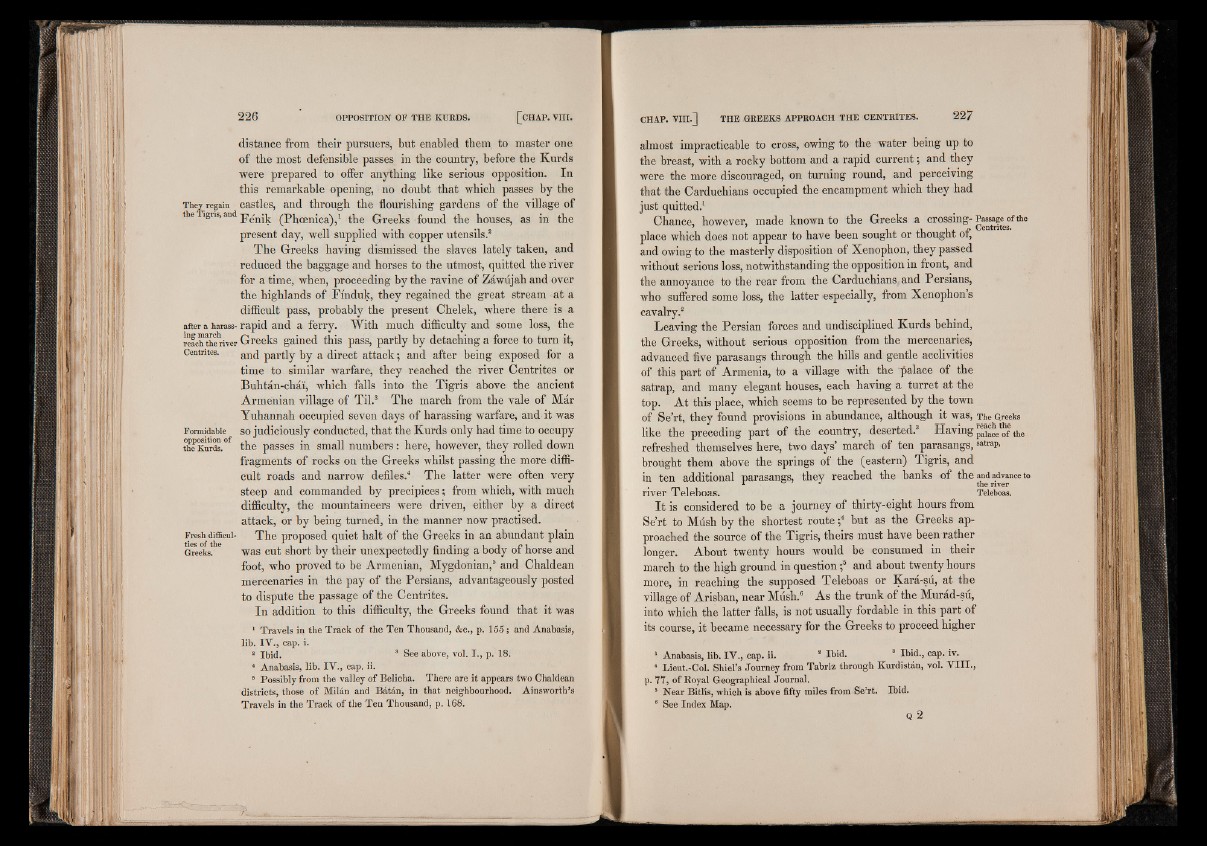
distance from their pursuers, but enabled them to master one
of the most defensible passes in the country, before the Kurds
were prepared to offer anything like serious opposition. In
this remarkable opening, no doubt that which passes by the
They regain castles, and through the flourishing gardens of the village of
the Tigris, and jyenik (Phcenica),1 the Greeks found the houses, as in the
present day, well supplied with copper utensils.2
The Greeks having dismissed the slaves lately taken, and
reduced the baggage and horses to the utmost, quitted the river
for a time, when, proceeding by the ravine of Záwújah and over
the highlands of Finduk, they regained the great stream at a
difficult pass, probably the present Chelek, where there is a
after a harass- rapid and a ferry. With much difficulty and some loss, the
reach theri-ver Greeks gained this pass, partly by detaching a force to turn it,
Centrites. an¿ partly by a direct attack; and after being exposed for a
time to similar warfare, they reached the river Centrites or
Buhtán-chai, which falls into the Tigris above the ancient
Armenian village of Til.3 The march from the vale of Már
Yuhannah occupied seven days of harassing warfare, and it was
Formidable so judiciously conducted, that the Kurds only had time to occupy
fteK u rd s .° the passes in small numbers: here, however, they rolled down
fragments of rocks on the Greeks whilst passing the more difficult
roads and narrow defiles.4 The latter were often very
steep and commanded by precipices; from which, with much
difficulty, the mountaineers were driven, either by a direct
attack, or by being turned, in the manner now practised.
Fresh difficul- The proposed quiet halt of the Greeks in an abundant plain
Greeks. was cut short by their unexpectedly finding a body of horse and
foot, who proved to be Armenian, Mygdonian,6 and Chaldean
mercenaries in the pay of the Persians, advantageously posted
to dispute the passage of the Centrites.
In addition to this difficulty, the Greeks found that it was
1 Travels in the Track of the Ten Thousand, &c., p. 155; and Anabasis,
lib. IV ., cap. i.
! Ibid. 3 See above, vol. I ., p. 18.
4 Anabasis, lib. IV ., cap. ii.
5 Possibly from the valley of Belicha. There are it appears two Chaldean
districts, those of Milán and Bátan, in that neighbourhood. Ainsworth’s
Travels in the Track of the Ten Thousand, p. 168.
almost impracticable to cross, owing to the water being up to
the breast, with a rocky bottom and a rapid current; and they
were the more discouraged, on turning round, and perceiving
that the Carduchians occupied the encampment which they had
just quitted.1
Chance, however, made known to the Greeks a crossing-Passage of the
( lentntes
place which does not appear to have been sought or thought of,
and owing to the masterly disposition of Xenophon, they passed
without serious loss, notwithstanding the opposition in front, and
the annoyance to the rear from the Carduchians, and Persians,
who suffered some loss, the latter especially, from Xenophon s
cavalry,2
Leaving the Persian forces and undisciplined Kurds behind,
the Greeks, without serious opposition from the mercenaries,
advanced five parasangs through the hills and gentle acclivities
of this part of Armenia, to a village with the palace of the
satrap, and many elegant houses, each having a turret at the
top. At this place, which seems to be represented by the town
of Se’rt, they found provisions in abundance, although it was, The Greeks
like the preceding part of the country, deserted.3 Having the
refreshed themselves here, two days’ march of ten parasangs, satrap,
brought them above the springs of the (eastern) Tigris, and
in ten additional parasangs, they reached the banks of the and advance to
river Teleboas. Teleboas.
It is considered to be a journey of thirty-eight hours from
Se’rt to Mush by the shortest route ;4 but as the Greeks approached
the source of the Tigris, theirs must have been rather
longer. About twenty hours would be consumed in their
march to the high ground in question ;5 and about twenty hours
more, in reaching the supposed Teleboas or Kara-su, at the
village of Arisban, near Mush.6 As the trunk of the Murad-sú,
into which the latter falls, is not usually fordable in this part of
its course, it became necessary for the Greeks to proceed higher
1 Anabasis, lib. IV ., cap. ii. 2 Ibid. 8 Ibid., cap. iv.
4 Lieut.-Col. Shiel’s Journey from Tabriz through Kurdistin, vol. V I I I .,
p. 77, of Boyal Geographical Journal.
5 Near Bitlis, which is above fifty miles from Se’rt. Ibid.
6 See Index Map.
Q 2